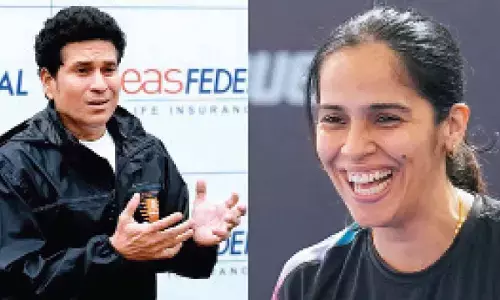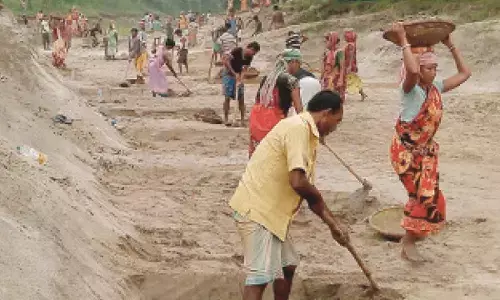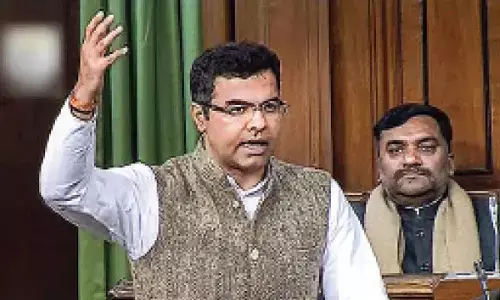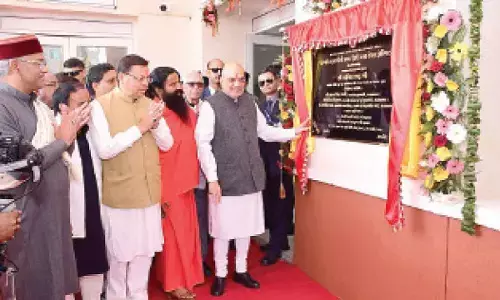History, politics and biopic
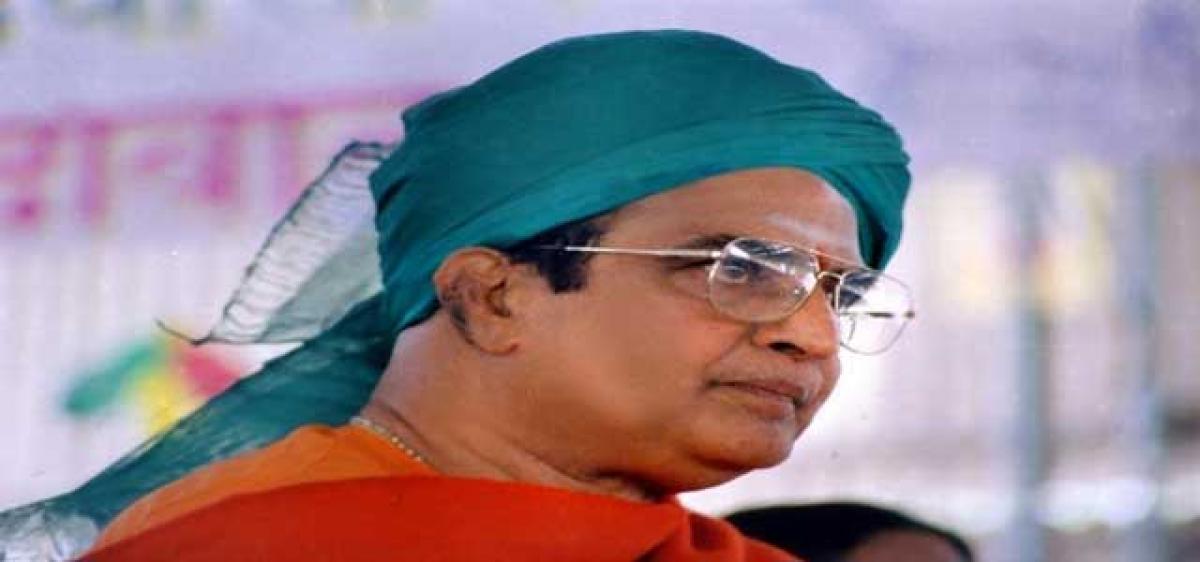
The announcement of Nandamuri Balakrishna that he would be producing a biopic on the legendary actor-turned-politician, NT Rama Rao, obviously raises many questions.
The announcement of Nandamuri Balakrishna that he would be producing a biopic on the legendary actor-turned-politician, NT Rama Rao, obviously raises many questions.
As the film will be produced not just by NTR’s son but by the legislator of ruling Telugu Desam Party (TDP), one can easily visualise the contours and the contents of the film, especially in regard to the controversial portions of NTR’s political history, more precisely, the revolt in TDP led by the present Chief Minister and NTR’s son-in-law, N Chandrababu Naidu.
There is a scramble within the NTR’s pariwar and the political system to usurp the legacy of NTR. Attempts of N Hari Krishna to appropriate the legacy of NTR proved to be a damp squib.
Lakshmi Parvathi’s assertion that she represents the political legacy of her husband N T Rama Rao was also summarily rejected by the electorate in united Andhra Pradesh. Even Junior NTR’s plans to position himself as a unique heir of his grandfather did not fructify.
In case the BJP severs its ties with the TDP, in all likelihood, the saffron brigade may try to project NTR’s daughter D Purandeswari. Interestingly enough, even the YSR Congress Party, the arch-rival of TDP, does not antagonise NTR’s legacy.
The Congress with which NTR waged a lifelong battle also does not deride Rama Rao’s invincible political legacy. Thus is the charisma of this legendary actor who was in fact a demigod for Telugus.
As a Chief Minister, NTR’s far-reaching actions like abolition of Patwari system endeared him to the rural folk of Telangana, too. His visionary decision to install mandal system has largely decentralised the administration in the state.
NTR’s welfare agenda, though dismissed as mere populism during his times by his political adversaries, continues to inspire the contemporary political discourse and electoral philosophy of vote-hunting political parties.
The present version of TDP that NTR disowned during his last days is in a desperate mood to monopolise his legacy.
The TDP vociferously demands Bharat Ratna for NTR. But, it failed to use its leverage with the first NDA government led by Vajpayee to bestow on NTR this coveted honour.
Such questions still embarrass the TDP leadership. Perhaps, the biopic might have been toyed to silent many such irritant questions.
The democratic polity clearly held that the real TDP is the one led by N Chandrababu Naidu. In fact, even NTR’s claims were also rejected by the people.
But, the schism in the TDP, the rift between NTR and Chandrababu Naidu for whatever may be the reason etc., would certainly be the most controversial aspects.
Lakshmi Parvathi has threatened to move court if Chandrababu Naidu is portrayed as hero in the proposed film. She said that she will not keep quiet if ‘historical facts’ were twisted in the biopic.
Meanwhile, Bonda Uma, a TDP legislator, said Lakshmi Parvathi would indeed be the villain in the film. "She is a villain in real life and she will be villain in the film too.
She distanced NTR from people and everybody knows this," he said. Thus, on the day of announcement itself, the proposed film kicked off a controversy.
More firecrackers are certain to follow. Media shall enjoy spicier stories surrounding the controversy in the coming days.
Yet again, the transition of power within NTR’s family and the party will be the focal point of political discourse in the state.
Normally, the filmic view of a personality is more dramatic. The idea of the filmmaker is to project a larger than life image of N T Rama Rao.
There is no denial of the fact that N T Rama Rao was one of India’s highly charismatic leaders, who could carve out a unique place for himself in the contemporary political history of the country.
But, the political environment that catapulted him to power cannot be ignored. In 1983 the time when NTR had his political arangetram, there was a strong anti-incumbency against the then ruling Congress regime.
The opposition camp suffered from a major leadership vacuum. N T Rama Rao with his formidable image could galvanise the people’s anger against the then ruling dispensation.
Will the biopic portray the political conditions prevailing at the time of NTR entering politics? It should in fact do so if it’s truly a politico-biographical film.
But, critics, however, feel that the whole idea of the film would be to glorify the political personality of NTR to claim the right to his legacy rather than chronicle the biography of a contemporary political leader on the celluloid for the future generations to appreciate.
N T Rama Rao‘s political legacy is associated with the struggle for preserving India’s federal system. He was the champion of the rights of states. He rallied the national opposition in this struggle against Centre’s autocracy.
Though this political idiom is still relevant, the TDP no longer has such a strong desire to fight with the Centre. Instead, it now chooses to negotiate with the Centre.
Its prevarication on Centre’s blatant denial to grant special status despite Prime Minister’s assurance on the floor of parliament and a clear electoral promise by the TDP-BJP combine in the run-up to elections is an apt illustration of the changed political profile of TDP as compared to the party led by NT Rama Rao.
How best the cherished legacy of NTR as a fighter against Centre’s unilateralism will be featured in this film now in the context of changed priorities for the party is something to be keenly watched.
Meanwhile, political biographers are not unanimous in assessing N T Rama Rao and his politics and leadership. Critics feel that TDP under his leadership itself imbibed the hierarchised and monarchic style of leadership.
The style of NTR was characterised by arbitrary and impulsive decision-making. N T Rama Rao came back to power, gaining from his electoral promise of total prohibition besides food security schemes.
NTR implemented total prohibition hitting dominant economic interests of particularly of the lumpen class. Economic and financial oligarchy was opposed to NTR’s populist schemes. But, Rama Rao steadfastly implemented them.
The ruling TDP in Andhra Pradesh is no longer committed to policies of total prohibition espoused by its founder.
The TDP may have its own justification for altering its public policy agenda. But, in the changed context, whether the biopic will highlight these policy concerns of Rama Rao is a million dollar question.
The crisis in TDP is yet another explosive subject. The legislators who won on the charisma and the populism of NT Rama Rao deserted him and even humiliated him when he went to seek their support on the roads of Hyderabad.
The biopic cannot show these scenes at any cost. But, it may show the internal developments in TDP that led to the revolt, especially the controversial role of Lakshmi Parvathi. The TDP leader’s comment that she will be the villain in the film reinforces this analysis.
Will an incisive analysis of NT Rama Rao’s contribution to Indian politics and democracy be shown in the film? It is a debating point.
Absence of any such in-depth assessment will be justified on the ground that there are limitations in the film medium even if it is featuring a political personality.
But, the future acrimony will be centred on the way the biopic portrays the disreputable palace politics.









